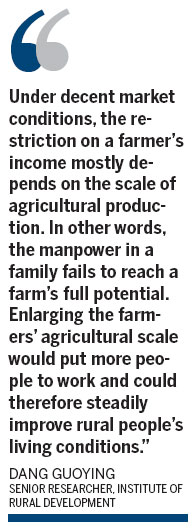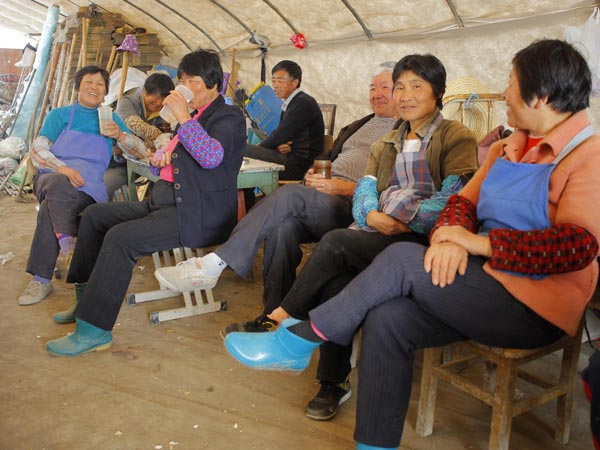Making it a family affair on the land
|
Employees of Cao Xinyun's watermelon farm in suburban Shanghai taking a break. They say the watermelon business is very profitable in Shanghai, especially in summer. Cao runs a watermelon farm in Yexie township, in the Songjiang district of Shanghai. [Photo/China Daily] |
Farming practices undergo radical change in pursuit of higher incomes
Sun Hongrong knew little about farming before he was 35, even though his dad worked on the land.
He followed his father's advice and went to college in the city, where he eventually found a job, cutting all connection with the cultivation of produce and raising of livestock.
But now, at the age of 39, he is a professional farmer and also the youngest owner of a family farm in Tongjian village, in Shanghai's suburban Songjiang district.
By planting rice and raising chickens and ducks on his nine hectare farm he earned about 300,000 yuan ($48,387) in 2012, a sum several times higher than the salary of his former job.
"No one supported me when I decided to quit as sales manager at a feed company four years ago but I have now convinced almost every one that I made the right decision," Sun said.
The term "family farm" sounds novel to most people in China. It reminds them of the vast, beautiful farmland in the United States as witnessed in movies. Conversely, in China, traditional farming is linked with hard, dirty, demanding manual labor.
However, change is afoot, just as it was almost 30 years ago when China introduced the household contract responsibility system to the vast countryside.

Then it enabled farmers to use land through long-term contracts and keep their produce after paying taxes.
In the 1980s and 1990s, before land transfers received the official nod, farmers were confined to a small patch of land. The fragmentation of farmland made the use of large machinery problematic.
However, in recent years, as more and more farmers moved to cities to seek better-paying jobs amid China's fast urbanization, lots of land was deserted and left to fall fallow.
"About 90 percent of rural residents had non-agricultural jobs in Songjiang in 2007. Only 6.6 percent - 12,500 people - were directly engaged in farming," said the Songjiang Agriculture Commission.
Under a pilot scheme approved by the district authority, farmers in Songjiang district, which is traditionally a major granary for Shanghai, started to experiment with the family farm concept in 2007.
Under the scheme, a qualified rural family could sign a contract with the village authority and rent the management rights to a large patch of arable land from other families for more than three years.
"Specifically, a family farm is owned and operated by one family. It should also refer to one that is quite big, ranging from about seven to 10 hectares, and use family members as the major manpower," said Xu Aifang, deputy director of the Agriculture Office of Yexie county, Songjiang district.
Currently, 80 percent of the approximate 9,100 hectares of arable land in Songjiang district is operated by about 2,000 family farms.
Issued in January 2013, China's first policy document for the year, known as the No 1 central government document, which is always considered as a weather vane for the annual agriculture policy, for the first time mentioned the term "family farm".
The government will create policies to speed up rural land transfers and grant more subsidies to large-scale landholders, family farms and rural cooperatives to encourage the establishment of large-scale and specialized farming, the document said.
There are more than 6,670 family farms operating in today's China, under 33 pilot land transfer projects approved by the Ministry of Agriculture, according to the Xinhua News Agency.
Jiang Yongqiu, 58, a skilled tractor driver and an experienced rice grower, said he earned more than 80,000 yuan by planting rice on his family farm last year, a sum he "dared not imagine before".
Jiang said most of his life he barely earned any money.
"I drove tractors for more than 30 years before running this farm. I remember for a very long time the pay was just two yuan a day. I had a small patch of land to grow some rice to feed the family. That was all of my income," he said.
Since 2007, Jiang has been renting land from the 40 families in his village for about 47 yuan a hectare. He receives about 41 yuan a hectare as a subsidy from the government as an encouragement to support family farms.
"So the cost of the land is almost covered by the government," he said.
Jiang bought an apartment in the central area of Songjiang district last year for 300,000 yuan.
Xu said when they started the pilot scheme few were willing to give it a try, largely because of concerns about the relatively big input for farming land of more than seven hectares and the stability of the government's subsidy policy.
"But too many people are applying to join the program these days and we have to create a higher threshold to select qualified family farm operators," she said, adding that young or middle-aged people with a rural home and agricultural skills are preferred.
"Under decent market conditions, the restriction on a farmer's income mostly depends on the scale of agricultural production. In other words, the manpower in a family fails to reach a farm's full potential. Enlarging the farmers' agricultural scale would put more people to work and could therefore steadily improve rural people's living conditions," said Dang Guoying, a senior researcher with the Institute of Rural Development under the Chinese Academy of Social Sciences.
A rough calculation suggests China has to reduce its number of agricultural households to 30 million to ensure rural residents' income is on a par with that of urban citizens, taking into account the continuous rise of the average urban income, he added.
Sun Hongrong said he hopes the government will extend the contract for land transfers.
"A 10-year contract would be ideal," he said. Sun is considering becoming an organic farmer but the higher added-value requires a larger personal input.
He said it is vital to regulate family farm operators' activities, including preventing the soil from being exhausted of its nutrients and keeping it free from pollution caused by the disposal of plastics or excessive use of fertilizer.
China's grain output rose 3.2 percent year-on-year to hit a record high of 590 million tons in 2012, marking the ninth consecutive year of growth.
However, official customs figures show that the country's grain imports also hit a record high of 72.3 million tons last year, which is evidence of a strained balance between domestic grain supply and demand.
xieyu@chinadaily.com.cn
























